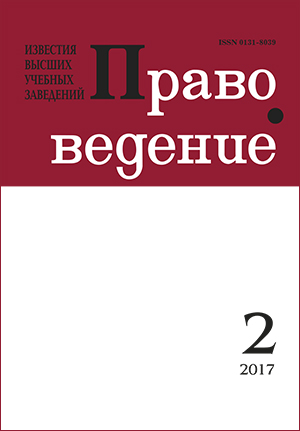Problems of definition of the limits of time and space imposed on the jurisdiction of international criminal institutions
Abstract
The article considers the problem of delimitation of temporal and territorial jurisdiction of international criminal judicial institutions and of the states where such international bodies have performed or perform their activity. From this point of view, the author divides all international criminal judicial institutions in three groups. The first group includes, in particular, the Nuremberg Tribunal which had jurisdiction over all crimes committed by the defendants during the Second World War, irrespective of the place where these crimes had been committed. The second group includes, in particular, the International Tribunals for the former Yugoslavia and Rwanda established by the UN Security Council. Their jurisdiction is limited only to the territory of the relevant states and to the time periods indicated in the resolutions of the UN Security Council. The third group includes the International Criminal Court which has jurisdiction only over the territory of the member states within the period of validity of the Court Statute for the state concerned. Special attention is paid to the situation when the borders of a member state are changed. Such a situation arose in 2016 when the Pre-Trial Chamber of the International Criminal Court authorized the Prosecutor to investigate the crimes committed during the armed conflict in South Ossetia in 2008. However South Ossetia proclaimed its independence from Georgia in 1992 and is not a member state of the International Criminal Court. The author poses a question: who shall define the territorial limits of the ICC jurisdiction in cases when the state affiliation of a certain territory is disputable? In the author’s opinion, the International Criminal Court as an international intergovernmental organization has a right to define its position on any legally relevant issue of an international life. However, its position is not binding for other states and international organizations and may not preclude them from taking another position and acting according to it, including the refusal from cooperation with the ICC in the investigation of a disputable situation. To enhance the authority and justification of the ICC solutions to similar political issues related, in particular, to the international and legal status of a given territory, the author proposes to refer such issues to the Assembly of States Parties.
Keywords:
international law, international criminal law, international criminal judicial institutions, jurisdiction of the International Criminal Court, international justice, conflict in South Ossetia
Downloads
References
Downloads
Published
How to Cite
Issue
Section
License
Articles of "Pravovedenie" are open access distributed under the terms of the License Agreement with Saint Petersburg State University, which permits to the authors unrestricted distribution and self-archiving free of charge.




